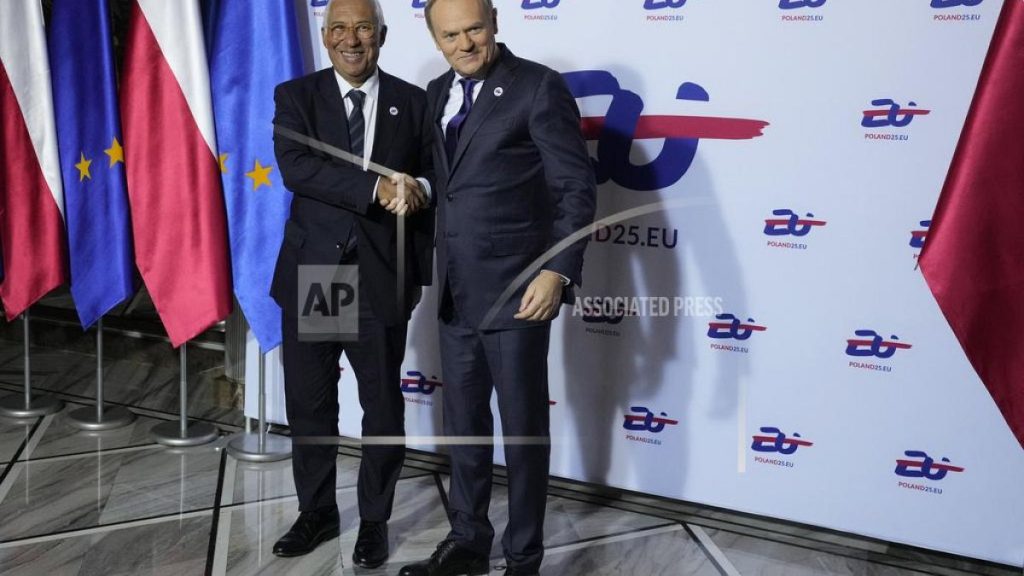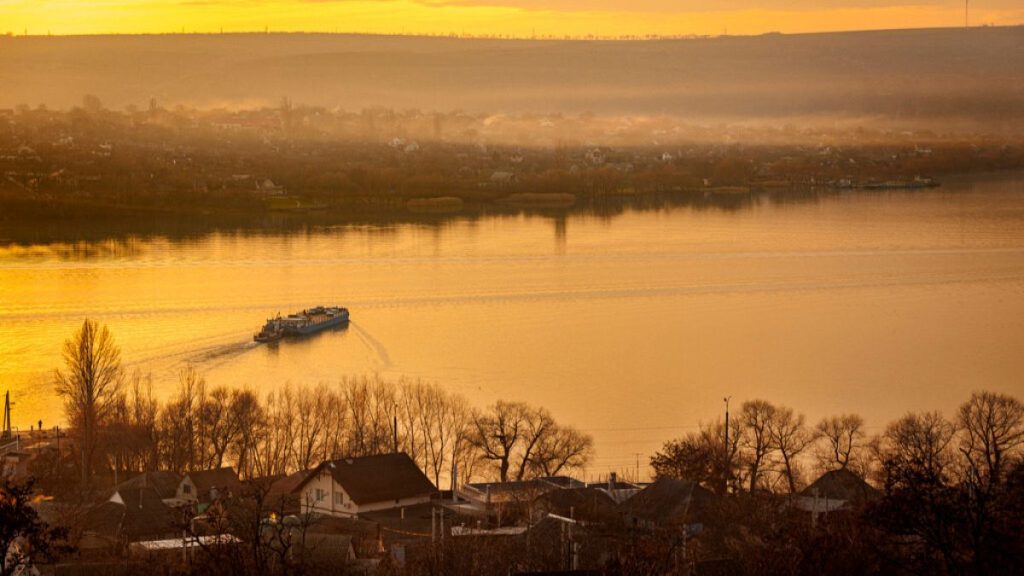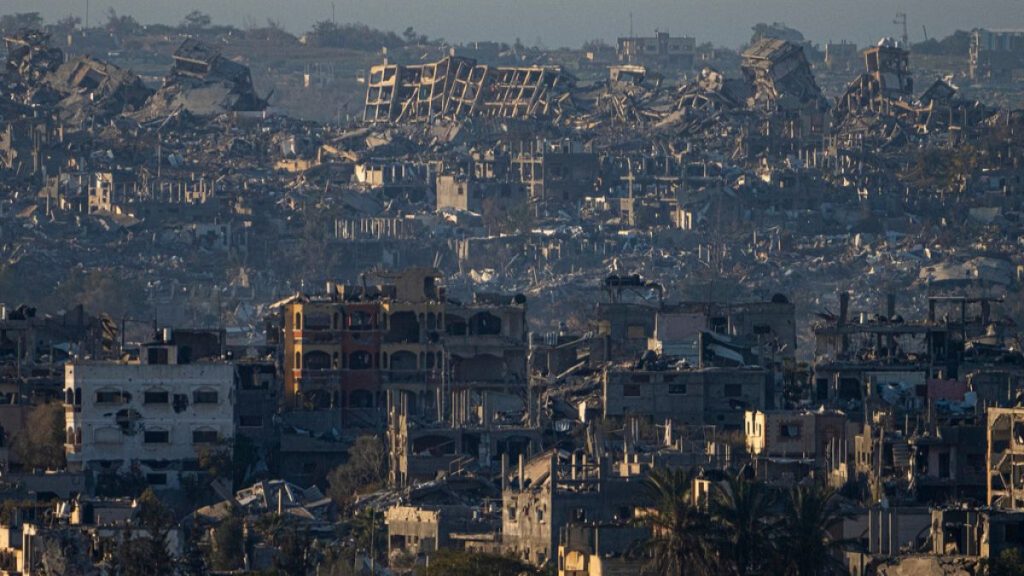Former Dutch PM Mark Rutte will take over as secretary general of the alliance on 1 October. He will have to use his political survival skills as an astute negotiator to persuade members to spend more on defence and keep supporting Ukraine.
On 1 October, when Dutch liberal-conservative former prime minister Mark Rutte will officially step up to the plate as NATO secretary general, the US will be at the height of one of the most polarised, radicalised, and potentially destabilising presidential electoral campaigns in recent history.
To be up to the task, the Dutch politician will have to fall back on his 14 years of experience at the helm of capricious coalition governments, often under fire from Geert Wilders’ hardline populist opposition and a major political scandal concerning some of his allies that left him untouched.
Thanks to his political flexibility, craftiness, pragmatism, and a good dose of political opportunism, Rutte earned the nickname of « Teflon Mark » back home. Could this political survival kit be useful for the NATO secretary general’s mission in the increasingly polarised world?
His personal history in international politics is marked by the dramatic momentum of the Moscow-backed separatists’ downing of the MH-17 civilian passenger plane in Ukraine’s eastern region of the Donbas. The disaster 10 years ago was a turning point for Rutte, who realised that the eastern flank of Europe and world politics in general are not just about trade and business opportunities.
In fact, it is about precisely defined strategic objectives that sometimes demand doing what is right rather than what is simply profitable.
One of the last crucial decisions Rutte took before stepping down as prime minister in 2023 was to deliver 24 Dutch F-16 fighter planes to Ukraine in spite of Russian warnings not to do so.
The conclusions of the Washington summit and the Pledge of Long-Term Security Assistance for Ukraine, which sets out €40 billion of military aid per year for Ukraine, set out the mandate for the incoming NATO leadership quite clearly.
And it is now NATO that will directly manage and coordinate the funding and military support for Ukraine in the war against Russia.
So far, these tasks have been carried out by the US-led Rammstein Group, an international contact body of 57 countries, including NATO and the EU.
What does Rutte’s new job entail?
The alliance’s secretary general has to coordinate and create consensus among the members. Since the NATO decision-making process is based on unanimity and members have a wide variety of strategic interests that do not always converge, the job also entails formulating common policy via mediation.
Rutte could also flex his economic acumen when battling certain partners’ alleged excessive deficit issues. In fact, he was one of the prominent figures representing the so-called « frugal states » club during the EU’s debt crisis and the economic collapse caused by COVID-19, and he has learned how to find a common way out after having to wrestle with the anti-austerity bloc.
The incoming autumn is expected to bring three crucial answers to the world political arena: who will be elected US president, what is the true operational military effectiveness of NATO’s air weaponry that has been delivered to Ukraine, and how functional the EU institutions will be after the challenging electoral quakes of June and July.
The common feature of these three issues is the increasing fragility of the contemporary political order, which has become a genuine stress test for international organisations and national institutions.
In Washington, after three decades of self-rumination, the 32 member states have asserted that NATO is a military alliance called to protect a rule-based world order. Yet, there are many questions the allies will be forced to answer in the upcoming period.
The public wants to know who will pay to build strong armies, what the costs will be, where the threats are coming from, and why they should engage their respective armies in remote areas of the planet.
Almost every country has its own security concerns that are often incompatible with others, especially in times of trouble. The enlarged alliance has stretched the scope of how risks and threats are commonly handed and created hazardous rifts even among the strongest Cold War allies.
Rutte’s political experience is expected to fill these gaps.
Broker and prime minister
»Rutte has been able to keep three coalitions government together. Despite downsides and political scandals, he has managed to survive, since 2010 until 2024. So this shows that he is a master at bringing parties together, negotiating compromises and creating bridges to bring parties together, » Dick Zandee, head of the Security and Defence Program of The Hague-based Clingendael Institute, told L’Observatoire de l’Europe.
« That is exactly the role the secretary general has to play’.’
The secretary general has no right to take on any legislative initiative since NATO is a military alliance and not a normative international organisation. But there are ways of settling scores, Zandee explained.
»Good relations are essential. And he has excellent ties with (French President Emmanuel) Macron, traditionally a good entente with Berlin, more on the monetary issues than the military ones, and with the governments and the administrations of the UK and the US’.’
In fact, Rutte shares the same political benchmarks with the rest of the leaders: free-market, global trade, individual freedom and strong transatlantic relations.
Yet, leadership can be fickle and transitory. The people in charge change, the opinion of the electorates is increasingly erratic, and NATO also has member countries that don’t share the same sensitivity for the so-called »liberal values ».
While Rutte will replace the current secretary general of NATO, Jens Stoltenberg, a former Norwegian social-liberal PM, might seem like a minor shift, coming from an EU member state could be the key difference in Rutte’s advantage.
»Mark Rutte and Jens Stoltenberg are both extremely pro-Atlantic. The difference between the two politicians is that Rutte comes from an EU country, » Federico Santopinto, a senior research fellow at the French Institute for International and Strategic Affairs (IRIS), told L’Observatoire de l’Europe.
« The Dutch former prime minister could perhaps have the interest to combine better the interests of the European Union with the NATO ones. »
Despite their fiscal strife, Germany, France, Italy, Spain, Belgium, the Netherlands and the UK will have to invest their resources in the defence industry. In the medium term, they might face a dilemma between increasing their public debts or asking their voters to pay more taxes.
Santopinto explained that the risk is that there might not be enough money to finance initiatives under the North Star flag and construct an EU military-industrial complex.
»The EU has been focusing on a defence industrial policy since it has an industrial capacity that NATO by its own nature cannot have, even if it made some attempts in the most recent past, » he said.
« Mark Rutte could finally make clear that NATO has operational dimensions on how to use the troops and to establish the complementarity among the different armies by the standardization of their equipment. »
After a history degree at the University of Leyden and before entering politics, Rutte was an HR manager at Unilever for a couple of years. He might use this past professional experience to persuade the member states to make painful financial and political decisions.
The ‘frugal Dutchman’ dilemma
As for NATO spending, »the problem is no longer reaching 2%. It is done, » said Zandee.
« According to some politicians, especially in Eastern Europe, it is not enough. We have to go for 3%, whereas the Poles are already spending above 4% of their GDP. So that will be the issue because to modernise all the armed forces in Europe, not to speak about expanding them, one will need more than 2%. »
»The secretary general does not have his own basket of money where he can get money out of it. He can count on his ability to chair the meetings, visit the capitals and put some pressure on the governments. »
As for the war in Ukraine, the biggest challenge for NATO in Europe since the Berlin crisis in 1961, Rutte could have to mediate among the Alliance’s members, who are divided on three big strategic moves toward Russia: containment, rollback, and engagement.
Like the European liberal family, Mark Rutte has proved, as a prime minister, to promote the roll-back that implies the Russian withdrawal from Ukraine to the borders of 2014 (including Crimea and the Donbas) and no political relations with the current Kremlin regime.
»Rutte is a staunch supporter of the transatlantic relations. Like Stoltenberg, he defends the liberal (internationalist) approach to Ukraine. Recently, when he was still prime minister, he was one of the first to propose the F16 to Ukraine » reminds Federico Santopinto.
MH-17 flight, 10 years later
As a Dutch politician, Rutte tends to be more pragmatic and occasionally opportunistic rather than idealistic.
Nevertheless, in foreign policy and in relations with Russia, his liberal approach began prevailing over business-as-usual practicality on 17 July 2014, when the Malaysia Airlines MH17 flight between Amsterdam and Kuala Lumpur was shot down by a Russian antiaircraft missile while flying over the Donbas.
The battery and the crew were Russian and were operating for the Donbas pro-Moscow separatist militias of the so-called People’s Republic of Donetsk, acting in the conflict in the region under the orders of Igor Girkin, aka « Strelkov », a former GRU operative who was among the people convicted by a Dutch court for shooting down the airliner.
All the 298 people on board, including passengers and crew members, lost their lives. 193 of those victims were Dutch.
»He did not have this forward-looking attitude toward Russia, despite there were indicators that Putin was modernizing his armed forces. Rutte’s government continued doing business with Russia like the Germans and the others, » Zandee said.
« But the pictures of the MH17 represented a sort of key turning point because it had a tremendous impact that showed the ugly face of Russia. »
»The MH17 was the turning point followed by other events. It played an important role deep in his soul, in his mind. He’s always mentioning it as an important milestone in changing his attitude (toward Moscow). »
The liberal supporters of the roll-back approach towards Russia in NATO and in the EU are looking with some apprehension at the political events in France and in Germany, with a special focus on the US’ November presidential elections.
They are deeply concerned that reaching a ceasefire and containing Russia along the frozen conflict front line could eventually prevail.
And, in case of relevant political changes, they are afraid that some Western power could even start a renovated policy of engaging Putin’s Russia, or at least some sort of detente.
»Everybody is waiting for the US presidential election because Rutte has much more sympathy for Biden. Meanwhile, relations with Donald Trump could become more complicated, » said Santopinto.
As the head of the Dutch government, Rutte met Trump during his administration between 2016 and 2020.
Little lies of an honest broker
»He can be extremely smart in the negotiations. Some Dutch diplomats remember that at a NATO summit, Rutte told Trump: ‘Donald, you know, now we, the Europeans, are spending 40 or 45 billion more on defence since you have been at the White House. That is thanks to you.’ Of course, it was not true, » Zandee recalled.
« But he gave all the credit to Trump. And then Trump was flattered. Since then, Rutte got a very good entry ticket into the White House under Trump. »
The options discussed at the Washington summit give NATO a wide range of potential actions, stretching from the traditional European theatre to the Far East and the China Sea.
The Asia pivot strategy is mostly a US bid, while most EU member states would keep NATO’s main focus on the Eastern European flank, at most, in the southern Mediterranean, the Middle East, and the Sahel.
Extending the scope of the potential military operations of the alliance to the Pacific and the Far East could represent extra costs for both armament and logistics, as well as a dangerous progressive disengagement of the US military forces from Europe.
But could a Dutch secretary general become a broker between the European theatre powers and the let’s-turn-to-Asia advocates?
»China, of course, is a different matter. So there you see that countries like the UK and the Netherlands are following the Americans in terms of showing military presence in the Pacific, and the French are doing it, too, » Zandee said.
« But more continental countries don’t think that it is important. So, this is a potential division among European countries and a transatlantic split between Europe and the United States, it’s both an internal European and a transatlantic issue. »
China remains a fundamental trade and business partner and a huge competitor for Germany, France, Italy, Poland, and Hungary. For the EU, Beijing’s disputes are mostly of an economic nature. Very few European policymakers look at China as an existential military threat.
»If you go back to 2021, people were talking about a new NATO strategy to contain China. And then, of course, the invasion in Ukraine came, and the whole issue was dropped. Now, we put it at the top of the list, perhaps at the same level as Russia. But what does it mean? It’s a totally different degree of threat, » concluded Zandee.







